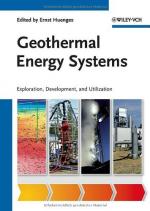|
This section contains 544 words (approx. 2 pages at 300 words per page) |

|
The discovery that the temperature in deep mines exceeded the surface temperature implied the existence of a source of deep geothermal energy. Within the continental crusts, the temperature differential gradient averages about one micro calorie per square centimeter (equivalent to an increase of about 95°F per mile or 33°C per kilometer of increasing depth).
In some areas geothermal energy is a viable economic alternative to conventional energy generation. Commercially viable geothermal fields have the same basic structure. The source of heat is generally a magmatic intrusion into Earth's crust. The magma intrusion generally measures 1110–1650°F (600–900°C), at a depth of 4.3–9.3 mi (7–15 km). The bedrock containing the intrusion conducts heat to overlying aquifers (i.e., layers of porous rock such as sandstone that contain significant amounts of water) covered by a dome-shaped layer of impermeable rock such as shale or by an over-lying fault thrust that contains...
|
This section contains 544 words (approx. 2 pages at 300 words per page) |

|


